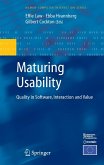User Experience has become a major research area in human-computer interaction. The area of game design and development has been focusing on user experience evaluation for the last 20 years, although a clear definition of user experience is still to be established.
The contributors to this volume explore concepts that enhance the overall user experience in games such as fun, playability, flow, immersion and many others. Presenting an overview of current practice from academia and industry in game development, the book shows a variety of methods that can be used to evaluate user experience in games, not only during game-play but also before and after the game play.
Evaluating User Experiences in Games:
- Presents a broad range of user experience evaluation methods and concepts;
- Provides insights on when to apply the various user experience evaluation methods in the development cycle and shows how methods can be also applied to a more general HCI context;
- Includes new research on evaluating user experience during game play and after; and social play;
- Describes new evaluation methods;
- Details methods that are also applicable for exertion games or tabletop games.
This comprehensive book will be welcomed by researchers and practitioners in the field.
It was a pleasure to provide an introduction to a new volume on user experience evaluation in games. The scope, depth, and diversity of the work here is amazing. It attests to the growing popularity of games and the increasing importance developing a range of theories, methods, and scales to evaluate them. This evolution is driven by the cost and complexity of games being developed today. It is also driven by the need to broaden the appeal of games. Many of the approaches described here are enabled by new tools and techniques. This book (along with a few others) represents a watershed in game evaluation and understanding. The eld of game evaluation has truly "come of age". The broader eld of HCI can begin to look toward game evaluation for fresh, critical, and sophisticated thi- ing about design evaluation and product development. They can also look to games for groundbreaking case studies of evaluation of products. I'll brie y summarize each chapter below and provide some commentary. In conclusion, I will mention a few common themes and offer some challenges. Discussion In Chapter 1, User Experience Evaluation in Entertainment, Bernhaupt gives an overview and presents a general framework on methods currently used for user experience evaluation. The methods presented in the following chapters are s- marized and thus allow the reader to quickly assess the right set of methods that will help to evaluate the game under development.
The contributors to this volume explore concepts that enhance the overall user experience in games such as fun, playability, flow, immersion and many others. Presenting an overview of current practice from academia and industry in game development, the book shows a variety of methods that can be used to evaluate user experience in games, not only during game-play but also before and after the game play.
Evaluating User Experiences in Games:
- Presents a broad range of user experience evaluation methods and concepts;
- Provides insights on when to apply the various user experience evaluation methods in the development cycle and shows how methods can be also applied to a more general HCI context;
- Includes new research on evaluating user experience during game play and after; and social play;
- Describes new evaluation methods;
- Details methods that are also applicable for exertion games or tabletop games.
This comprehensive book will be welcomed by researchers and practitioners in the field.
It was a pleasure to provide an introduction to a new volume on user experience evaluation in games. The scope, depth, and diversity of the work here is amazing. It attests to the growing popularity of games and the increasing importance developing a range of theories, methods, and scales to evaluate them. This evolution is driven by the cost and complexity of games being developed today. It is also driven by the need to broaden the appeal of games. Many of the approaches described here are enabled by new tools and techniques. This book (along with a few others) represents a watershed in game evaluation and understanding. The eld of game evaluation has truly "come of age". The broader eld of HCI can begin to look toward game evaluation for fresh, critical, and sophisticated thi- ing about design evaluation and product development. They can also look to games for groundbreaking case studies of evaluation of products. I'll brie y summarize each chapter below and provide some commentary. In conclusion, I will mention a few common themes and offer some challenges. Discussion In Chapter 1, User Experience Evaluation in Entertainment, Bernhaupt gives an overview and presents a general framework on methods currently used for user experience evaluation. The methods presented in the following chapters are s- marized and thus allow the reader to quickly assess the right set of methods that will help to evaluate the game under development.
From the reviews:
"The book promises to address the evaluation of user experience, it provides little in terms of actual analysis and more in terms of anecdotes of data collection efforts for various specific games. ... provides a broad overview of the practice of gathering user experience data for computer-based games. ... The current volume is appropriate for a course that introduces the concepts of collecting user feedback in a traditional HCI and game development setting." (Thom McLean, ACM Computing Reviews, December, 2010)
"The book promises to address the evaluation of user experience, it provides little in terms of actual analysis and more in terms of anecdotes of data collection efforts for various specific games. ... provides a broad overview of the practice of gathering user experience data for computer-based games. ... The current volume is appropriate for a course that introduces the concepts of collecting user feedback in a traditional HCI and game development setting." (Thom McLean, ACM Computing Reviews, December, 2010)








